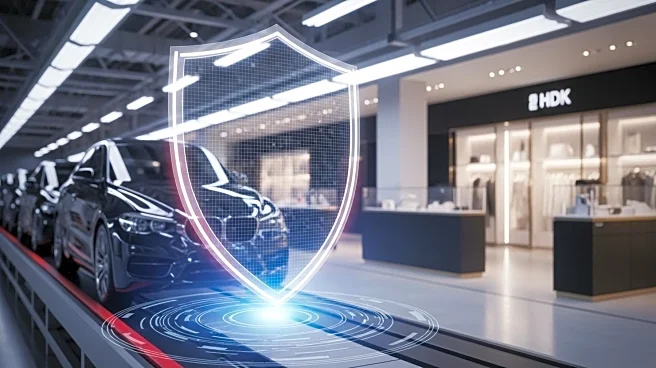What's Happening?
Jaguar Land Rover (JLR) has experienced a cyberattack that has significantly disrupted its production activities. The company, which rebranded as JLR two years ago, took immediate action by shutting down its systems to mitigate the impact. While there is no evidence of compromised customer data, the incident has also affected JLR's retail business. Experts like Nivedita Murthy from Black Duck emphasize the importance of containment in such situations, noting that JLR's swift response likely prevented further damage. This attack follows a previous incident in March 2025 by the Hellcat ransomware group, which targeted JLR's project management software. The production halt comes amid JLR's transition to electric vehicles and recent financial challenges, including a 49% drop in quarterly profits.
Why It's Important?
The cyberattack on JLR highlights the growing threat of cyber incidents in the automotive industry, particularly affecting supply chains. Such attacks can have widespread implications, impacting not only the victim but also their partners, distributors, and retailers. The manufacturing sector, especially automotive, is a prime target due to its complex supply chains. JLR's ability to react quickly may have minimized the impact on its operations and those of its supply chain partners. This incident underscores the need for robust cybersecurity measures to protect business operations and customer data, as attackers increasingly target retail operators for sensitive information.
What's Next?
JLR is working to restart its global applications in a controlled manner. The company will likely conduct a thorough investigation to identify how the attackers accessed their systems and take steps to prevent future incidents. As JLR transitions to a complete line of electric vehicles, ensuring cybersecurity will be crucial to maintaining operational stability and customer trust. The broader industry may see increased investment in cybersecurity measures to safeguard against similar attacks, particularly as supply chain vulnerabilities continue to be exploited.
Beyond the Headlines
The incident raises ethical and legal questions about data protection and the responsibility of companies to secure customer information. As cyberattacks become more sophisticated, businesses must prioritize cybersecurity to prevent breaches that could lead to phishing attacks and scams. The automotive industry's shift towards electric vehicles may also require new cybersecurity strategies to address emerging threats.










